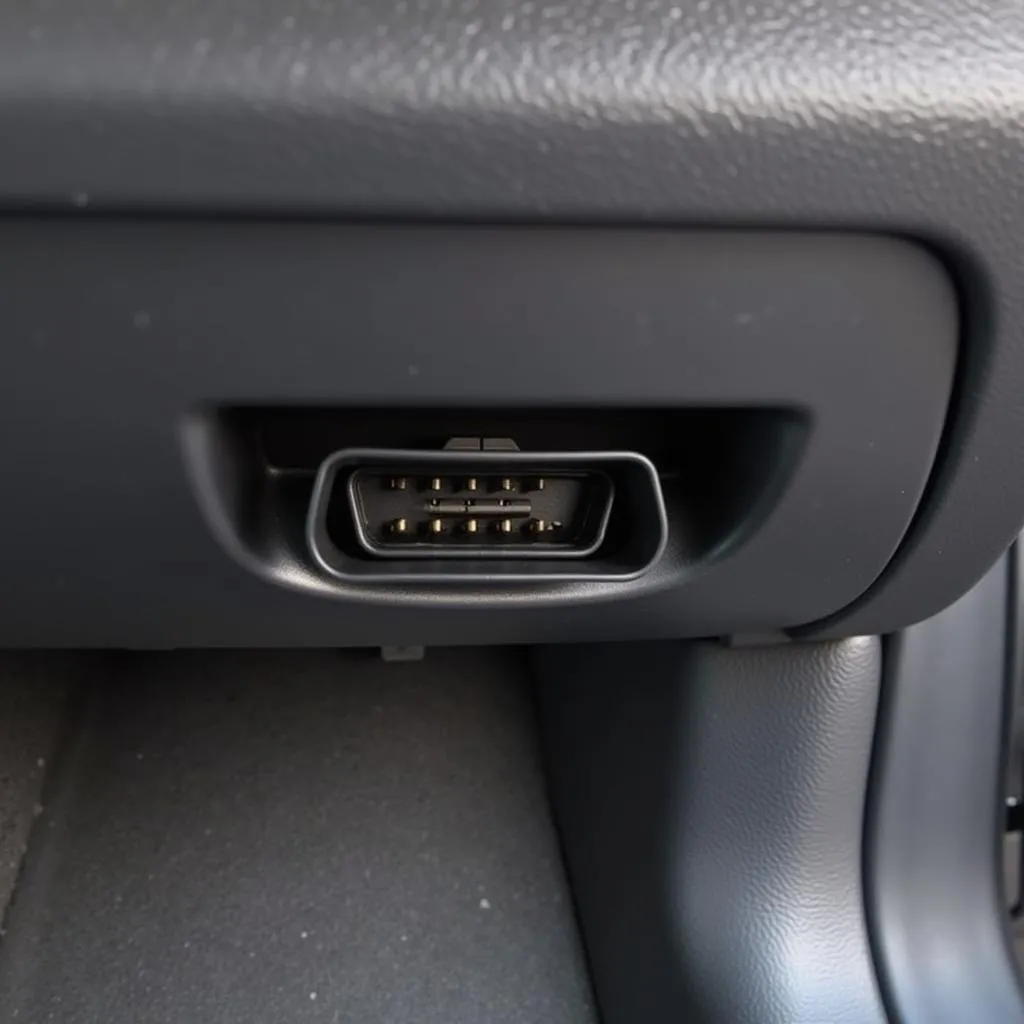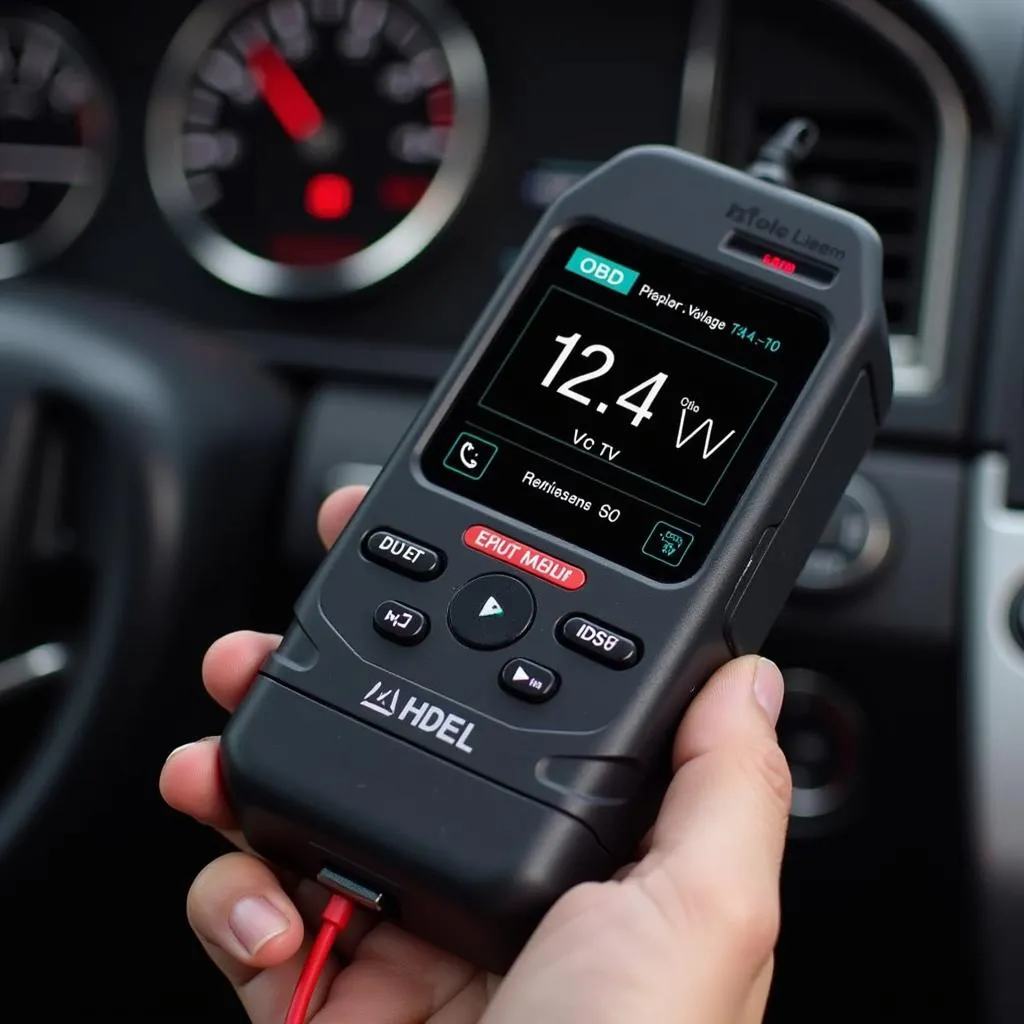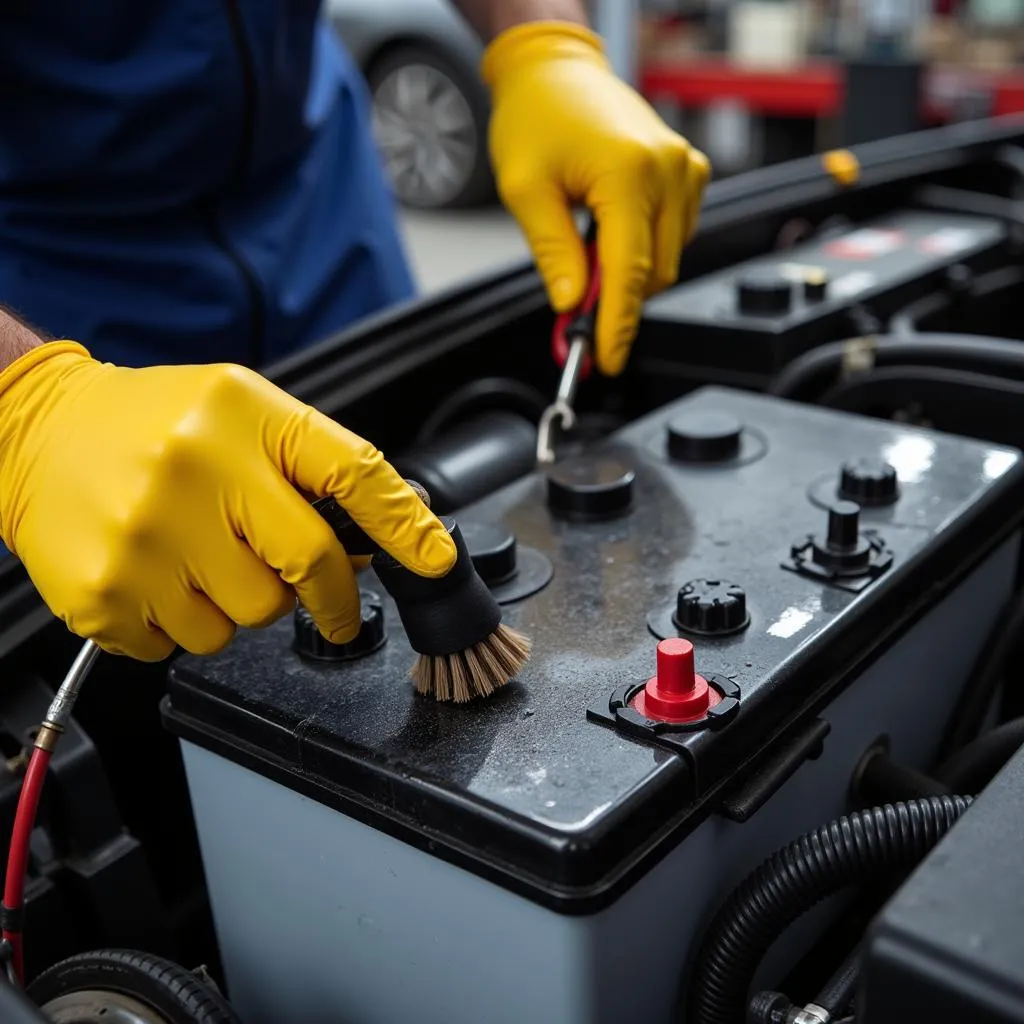Understanding your car battery’s health is crucial, and a Car Obd Battery Check can provide valuable insights. While traditional methods exist, OBD (On-Board Diagnostics) scanners offer a more sophisticated approach to monitor your battery’s voltage and overall condition.
This article will explore how to check your car battery using an OBD scanner, what the readings mean, and other essential information to help you keep your vehicle running smoothly.
How to Check Your Battery With an OBD2 Scanner
Checking your car battery with an OBD2 scanner is a straightforward process. Here’s a step-by-step guide:
- Locate Your OBD2 Port: This port is typically found under the driver’s side dashboard, beneath the steering wheel.
- Connect Your OBD2 Scanner: Plug the scanner into the port.
- Turn On Your Ignition: Turn your car to the “on” position but don’t start the engine. This will power up the OBD2 system.
- Access the Battery Voltage Reading: Navigate through the scanner’s menu to find the “Battery Voltage” or “Live Data” section.
- Interpret the Reading: A healthy battery should show a voltage reading of around 12.6 volts when the engine is off.
 Car OBD Port Location
Car OBD Port Location
Understanding OBD Battery Voltage Readings
The battery voltage reading provides a snapshot of your car battery’s charge level. Here’s a breakdown of what different voltage ranges indicate:
- 12.6 Volts or Higher: This indicates a fully charged and healthy battery.
- 12.4 – 12.6 Volts: Your battery has a good charge, but it’s not at its full potential.
- 12.0 – 12.4 Volts: Your battery is partially discharged and may require charging.
- Below 12.0 Volts: Your battery is significantly discharged and needs immediate attention. Driving with a battery this low can damage it or leave you stranded.
 OBD Scanner Battery Voltage
OBD Scanner Battery Voltage
It’s important to note that these readings are general guidelines. Several factors, including temperature and battery age, can influence the voltage.
Benefits of Using an OBD Scanner for Battery Checks
While a multimeter can also check your battery voltage, OBD scanners offer additional advantages:
- More Detailed Information: OBD scanners provide more than just voltage readings. They can also reveal battery temperature, charging system health, and other relevant data points.
- Early Detection of Issues: By regularly monitoring your battery’s condition with an OBD scanner, you can identify potential problems early on, preventing unexpected breakdowns.
- Convenient and User-Friendly: Modern OBD scanners are incredibly user-friendly, even for those unfamiliar with car maintenance. They often feature intuitive interfaces and clear instructions.
Common Causes of Car Battery Problems
Understanding the common causes of car battery problems can help you take preventative measures:
- Old Age: Car batteries have a limited lifespan, typically around 3-5 years.
- Extreme Temperatures: Both hot and cold weather can negatively impact battery performance and lifespan.
- Parasitic Drain: Electronic components in your car can continue to draw power even when the engine is off, slowly draining your battery.
- Loose or Corroded Battery Terminals: Poor connections can prevent your battery from receiving a proper charge.
Tips for Maintaining Your Car Battery
Here are some essential tips to help you prolong the life of your car battery:
- Regularly Clean Battery Terminals: Use a wire brush and a baking soda and water solution to remove any corrosion.
- Limit Short Trips: Short trips don’t allow your battery sufficient time to recharge fully.
- Turn Off Electronics When Not in Use: This helps minimize parasitic drain on your battery.
- Have Your Battery Tested Regularly: A professional mechanic can perform a more comprehensive battery test to assess its overall health.
 Cleaning Car Battery Terminals
Cleaning Car Battery Terminals
When to Seek Professional Help
While a car OBD battery check can provide valuable information, it’s crucial to seek professional help if:
- Your Battery Frequently Dies: If you experience frequent battery drain, there may be an underlying electrical issue that needs to be addressed.
- You Notice Physical Damage to the Battery: A cracked battery case or bulging sides requires immediate professional attention.
- Your Battery Warning Light Stays On: This is a clear indication of a charging system problem that needs to be diagnosed and repaired.
Conclusion
Regularly performing a car OBD battery check is a simple yet effective way to monitor the health of your battery and potentially avoid unexpected breakdowns. While OBD scanners provide a convenient and user-friendly way to do this, remember that they are just one tool in your car maintenance arsenal. Regularly inspecting your battery, cleaning the terminals, and seeking professional help when necessary are equally important steps in ensuring your vehicle starts reliably every time.
FAQs
Can I jump-start my car if the battery voltage is too low?
Yes, jump-starting can temporarily provide enough power to start your car if the battery is low. However, it’s crucial to address the underlying cause of the battery drain to prevent further issues.
Can I use any OBD2 scanner to check my battery?
Most OBD2 scanners will provide basic battery voltage readings. However, certain advanced scanners offer more detailed information about the battery’s health and charging system.
How often should I check my car battery voltage?
It’s good practice to check your battery voltage at least once a month, especially during extreme weather conditions.
What is a “deep cycle” battery, and do I need one?
Deep cycle batteries are designed to be discharged and recharged repeatedly, making them suitable for vehicles with high power demands, such as those with aftermarket audio systems or off-road vehicles.
Can I replace my car battery myself?
While replacing a car battery is possible, it’s recommended to have it done by a qualified mechanic, especially if you’re uncomfortable working with car electrical systems.
Want to Learn More?
For more information on OBD scanners, battery maintenance, and other car care tips, check out these related articles:
- Check Battery Voltage with OBD
- 96 Honda Accord Failed Smog Test OBD Not Ready
- 2008 Civic Hybrid OBD Port
Need assistance with your car’s electrical system or battery? Contact us via WhatsApp: +1(641)206-8880, Email: [email protected] or visit our workshop at 276 Reock St, City of Orange, NJ 07050, United States. Our team is available 24/7 to assist you.
